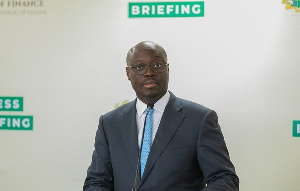The domestic cost of borrowing by government has now reached a five-year record, as more debt is issued to finance the deficit and mop-up liquidity to rein-in inflation, B&FT’s analysis has shown.
Since the beginning of August, the government has been paying 25 percent per annum on 91-day debt, which is equivalent to 25 pesewas on every cedi borrowed. That rate of interest is the highest since the third quarter of 2009, when three-month borrowing costs peaked at almost 26 percent.
At the start of this month, analysts at Barclays Ghana warned that they “expect the combination of inflation and the government’s current seemingly insatiable need for funds to continue exerting upward pressure on short-term Treasury yields”.
The main reasons for the growth in interest are increased borrowing to finance the budget deficit, high inflation (15.3 percent in July after rising for 10 straight months), and the deliberate driving-up of yields on cedi assets by the Bank of Ghana to mop-up excess liquidity and make holding those assets just as attractive as holding dollars -- and thereby curb the cedi’s rapid depreciation.
But debt servicing, including interest paid on foreign loans, is already devouring 40 percent of tax revenue and the persistent rise in domestic interest rates threatens to increase this ratio -- which analysts warn is unsustainable.
Three years ago, debt servicing cost 16 percent of tax revenue; but after two consecutive years of record budget deficits and a steep decline in the cedi, the ratio has more than doubled. An explosion in public sector salary expenditure in the same period has meant that compensation for government workers and interest payments now exceeds the value of tax revenues.
These trends are fuelling more borrowing to finance the capital budget, creating a vicious cycle of rising interest rates that cause more debt to be sold to undertake public investment.
The jump in Treasury yields has also exerted pressure on the average lending rate of banks, which rose to 28 percent in May -- the highest for four years.
According to Yvonne Mhango, a sub-Saharan Africa analyst at Renaissance Capital -- the emerging-markets investment firm, current high lending rates could trigger an increase in banks’ non-performing loans.
“We think sustained high rates are negative for banks as they increase funding costs and are negative for asset quality. We expect credit growth to slow from lofty levels of 47 percent year-on-year in May to the mid-20s in 2015, especially following the May lending rate hike of 230 basis points to 27.9 percent,” Ms. Mhango wrote in a research note on August 8.
Regarding the government’s request for International Monetary Fund (IMF) assistance to support its efforts to reduce economic imbalances, she said an IMF programme will entail “restrictive policy reforms” that will be negative for banks and consumer companies, and slow down investment and economic growth.
“We expect the IMF to recommend the budget deficit to be lowered to 7 percent of GDP in 2015 versus [an estimated] 10 percent of GDP in 2014. This implies a slowdown in fiscal spending, which we see as negative for fixed investment and, by implication, growth -- which we see slowing to 5.7 percent in 2014 and 4.5 percent in 2015.”
In its country report issued in June, the IMF said the scale of Ghana’s budget and current account deficits warrants more short-term austerity, and recommended a mixture of additional tax hikes and expenditure curbs to cut the twin deficits more quickly.
The government’s current target is to record a deficit of 8.8 percent of GDP at the end of 2014. But almost every analyst expects a wider gap unless further expenditure-control measures are implemented.
Slashing the deficit more quickly will bring down interest rates and improve the prospects for strong economic growth in the medium-term, the IMF argued in the report.
Business News of Monday, 18 August 2014
Source: BFT













